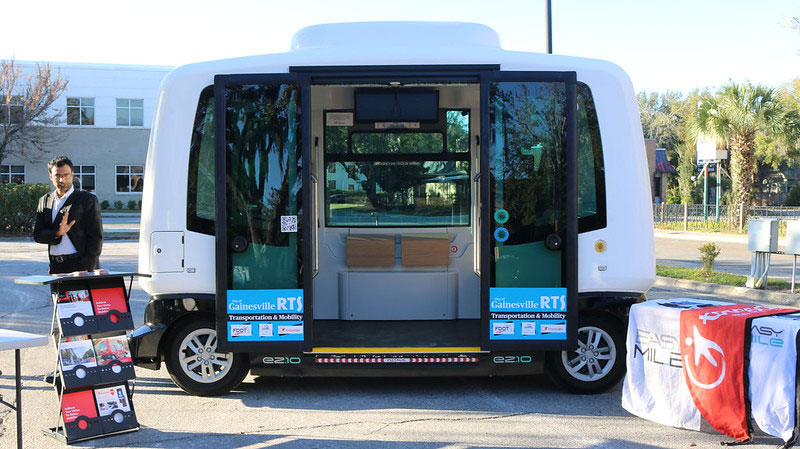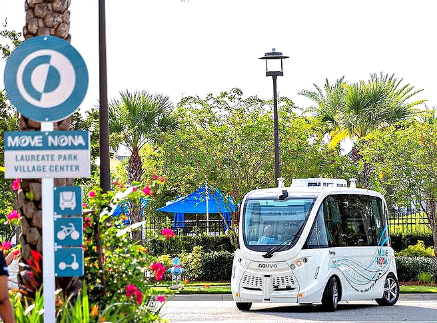
Dr. Pruthvi Manjunatha and Dr. Lily Elefteriadou of the UFTI are working on two studies to evaluate how other vehicles and pedestrians interact with Autonomous Vehicles (AV). The first study will evaluate the AV shuttle in Gainesville, FL, while the second will evaluate the AV shuttle in Lake Nona, FL. With more and more autonomous shuttles being deployed across the United States, it is important to understand how humans interact, perceive, and behave with AVs. The two studies will evaluate elements such as car-following behavior for vehicles following the AVs, and the behavior of pedestrians around AVs.
In the first study “Public Acceptance of Autonomous Vehicle (AV) Technology in Gainesville, FL,” which was led by Dr. Manjunatha, and funded by the University of Florida and the Florida Department of Transportation (FDOT), focused on the public’s readiness and comfort level or willingness to interact with AVs. The goals of this project were to evaluate the public perception of the Easymile (EZ10) autonomous shuttle and to evaluate and simulate the behavior of the autonomous shuttle using video and vehicle trajectory data. A “before” survey was conducted online and participants responded to various questions regarding their anticipated behavior with the shuttle.
Results from the study revealed that the public is generally interested in using or riding in an autonomous shuttle. However, they expressed unease in how they would interact with this new technology, if they, for example, were a bicyclist sharing the road with an AV or a pedestrian crossing the street in the presence of one of these incoming shuttles.
“The before survey showed there was a high degree of willingness to use the autonomous shuttle,” Dr. Manjunatha said. “There were some concerns on how to interact with the shuttle as pedestrians and bicyclists. For example, some of the survey participants said they would be cautious while using the crosswalk in front of the shuttle.”
The autonomous shuttle service is currently active, and the research team plans to collect additional data. An “after” survey will be conducted with the public who have had a chance to interact with the autonomous shuttle as passengers, drivers of vehicles, or as pedestrians and bicyclists as the shuttle traverses the streets of the City of Gainesville.
The Gainesville study created a survey instrument that can be used by city officials to evaluate the public’s readiness and willingness to interact with the Gainesville Easymile shuttle. It also created a framework to evaluate the change in public perception of AVs before and after the introduction of the autonomous shuttle.

The second project is scheduled to begin in November 2020 and will take place in Lake Nona, FL. The project “Evaluation of the Beep Autonomous Shuttle in Lake Nona” is led by Dr. Lily Elefteriadou and Dr. Manjunatha and funded by FDOT.
Both studies will capture the public’s readiness and willingness to interact with AVs. The studies also provide the public with the opportunity to communicate concerns about this new technology to policy makers and government entities, including how the pubic believes that AVs will affect their everyday lives.
“By identifying the barriers and facilitators of AV use, we will expedite the deployment of the technology from both a policy and practice perspective,” Dr. Manjunatha said. “We expect this will reduce transportation operating costs, attenuate the environmental impacts of transportation, improve the community’s social justice quotient, and save pedestrian, bicyclist, and vehicular lives.”